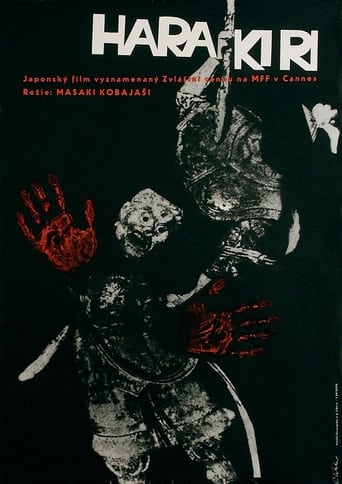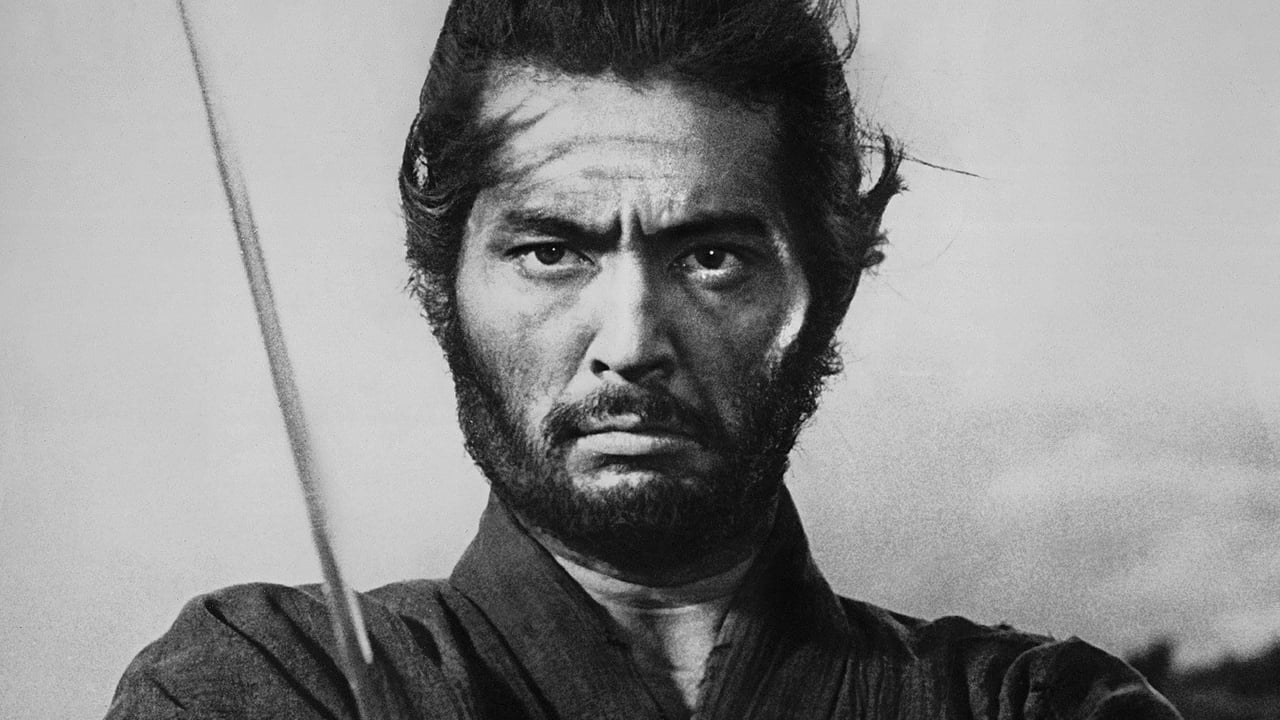classicsoncall
Unlike all the Kurosawa films I've seen, this one has a principal protagonist that announces his intention early in the story and then takes the viewer on a stunning journey of revenge that's entirely unexpected. Director Masaki Kobayashi prepares the viewer with a preliminary accounting of the fate of thousands of unemployed Samurai as a result of the 17th Century dissolution of the Japanese Shogunate. Masterless Samurai, or ronin, appear at the doorstep of a feudal lord requesting a place in which to perform ritual suicide, but for the dishonorable, this effort is merely a ploy to accept some small token of monetary value before moving on. "Harakiri" tells the story of two such ronin, and until we learn the true relationship of both men to each other, the viewer is at a loss to understand the real motivation of Hanshiro Tsugumo (Tatsuya Nakadai). With frequent forays into the past utilizing a series of flashbacks, Tsugumo relates the story of his son-in-law, helpless in the face of his wife's deteriorating physical condition and unable to seek medical attention for their sick baby due to lack of resources. What I found quite clever about the story was the absence of the three men Tsugumo called for to be his seconds for the purpose of hara-kiri. One realizes that it can't be simple coincidence that none of these men are available, as the story swerves to a desperate climax that pits Tsugumo against the entire House of Iyi. What would have been a tremendous let down in the story is avoided when Tsugumo follows through on his original mission, unable to physically overpower all the retainers employed by the clan's Master. So many films have the story's hero defeat an overwhelming number of rival opponents that it reduces the credibility factor to zero. At the point Tsugumo knows he can no longer pursue a fight strategy, he takes his life in the ritual manner. For followers of Japanese cinema, this film is a must see, with it's emphasis on honor, loyalty and embracing the truth of one's convictions. Tsugumo's unselfish final act unmasks the hypocrisy of the feudal lord's position, and mocks the cowardice of it's counselor Saito (Rentarô Mikuni). An appropriate amount of swordplay attends the story without becoming excessive, allowing for the more subtle aspects of Tsugumo's strategy to take over the narrative, which it does in compelling fashion.
Antonius Block
What is more dishonorable, out of work Samurai (Ronin) asking a clan to commit hara-kiri in their courtyard out of a desire to gain employment, with no intention of committing the act, or those in houses being cruel to them? When the country dishonors its Samurai, and they are driven to acts of desperation, leading to cruelty and further dishonor, the country spirals, and this movie set in 17th century seems to reflect decline in then present day (1962) Japan.The movie is quite beautiful visually, with traditional Japanese architecture and at one point a swaying bamboo forest framed beautifully by director Masaki Kobayashi. The story is taut and works on many levels, first and foremost as a vengeance with honor tale, which might remind you of an American Western, including a couple of epic battle scenes. It also has the individual man, disillusioned and saying that the Samurai code he lives by is a façade, and yet acting honorably, against a multitude misled by corrupt leaders. It's one against many in a battle that is timeless and certainly relevant today, and whose results are sadly akin to the entropy of the universe. "Who can know the depths of another man's heart?" the Samurai asks, signaling a need for empathy. Indeed.
popcorninhell
American ethos has always had a soft-spot for the conscientious objector. We're a nation of fervent individualists and everything from the writings of Mark Twain to the film 12 Angry Men (1957) codifies that idea. The power of an individual against a torrent of common corruption and blind group-think is almost fetishized, especially in contemporary society. The Japanese, generally speaking, don't have such a provocative streak of individualism embedded in their culture. So it's interesting that one of the most eloquent and austerely beautiful films on the subject should come from the land of the rising sun. Harakiri is a repudiation of the collective values of Japan that, on its best days unites a population in tragedy and at its worst marches a people towards war.Hanshiro Tsugumo (Nakadai) is an aging and embittered samurai whose feudal lord has died in battle along with most of his men. In order to reclaim his honor, according to the bushido code, Tsugumo must disembowel himself in a ritual suicide known as seppuku. To do this he arrives at the feet of Saito Kageyu (Mikuni) and asks members of the Iyi daimyo to help him do the ceremony correctly. Kageyu is hesitant as only a few days ago a similar request was made by another ronin who had no intention of committing seppuku but was looking to extort the clan for money. After Kageyu retells the man's tale, which culminates in the ronin dying by the blade of a bamboo sword, Tsugumo insists his intentions are to die with honor. Yet as the pavilion where the deed is to be done is setup, questions remain. What is Tsugumo's connection to the earlier ronin? Why did he pick the courtyard of the Iyi clan out of all others? Finally does he really intent to reclaim his honor, or is there something else going on?Told in a dizzying array of flashbacks and flash-forwards, Harakiri is not a leisurely movie to watch while folding laundry. It demands the attention of the viewer and weaves a complex tale of Hanshiro Tsugumo's home life after the fall of his clan. He's stricken with the most dire poverty, contemplating his daughter's (Iwashita) sale as a concubine and working menial jobs just to get by. His daughter, son-in-law Motome (Ishihama) and infant grandson Kingo are his only solace from a life of dishonor. Their fates become intimately intertwined with Tsugumo and the Iyi clan in unexpected ways and paying close attention to the plot pays off stunningly in the end.In his own quiet and ultimately unsettling way director Masaki Kobayashi strips away the nobility and romanticism commonly associated with feudal Japan. While doing so he implicates the modern audience (at the time the Japanese public circa 1962) in tolerating authoritarianism under the guise of honor. Harakiri recalls and parallels the days of Japanese imperialism and uses a single individual as a means to take apart the misplaced hubris of anyone still beholden to the old guard. Kobayashi himself was drafted in the army during WWII but repeatedly refused promotion beyond that of a private; his own way of fighting corruption, hypocrisy and evil.The film comes to a conclusion so damning and memorable that I dare not ruin the satisfaction of watching it for the first time. Harakiri is an absolute treasure featuring a star turn by Nakadai who first made an indelible mark on Japanese screens in Kobayashi's The Human Condition Trilogy (1959-1961). Here, while playing a character much older than himself, he still has a certain inner- turmoil that channels James Dean with a strong baritone. Finally there's Kobayashi's masterful direction which watches pensively and almost perversely as the jigsaw pieces fall in place.
Blanche Dubois
One of the best movies ever made ,''Harkiri'', tells the sad story of a man who wants to commit Harakiri to take revenge from the samurais that made his son-in-law also commit Harakiri.The movie is not actually about sword-fightings but it's about the meaning of life,family and pride. Although a long movie, ''Harakiri'', keeps you in interest because of the good climax of the story and the flashbacks. Kobayashi proves us that he is a ''Cinema- Master'' and makes us sink deep in the story.Tatsuya Nakadai gives an Oscar- worthy performance playing the main character of the film. Also the film has a great cinematography and music by Toru Takemitsu. It's a wonderful masterpiece that will make you appreciate Japanese cinema !


 AD
AD





